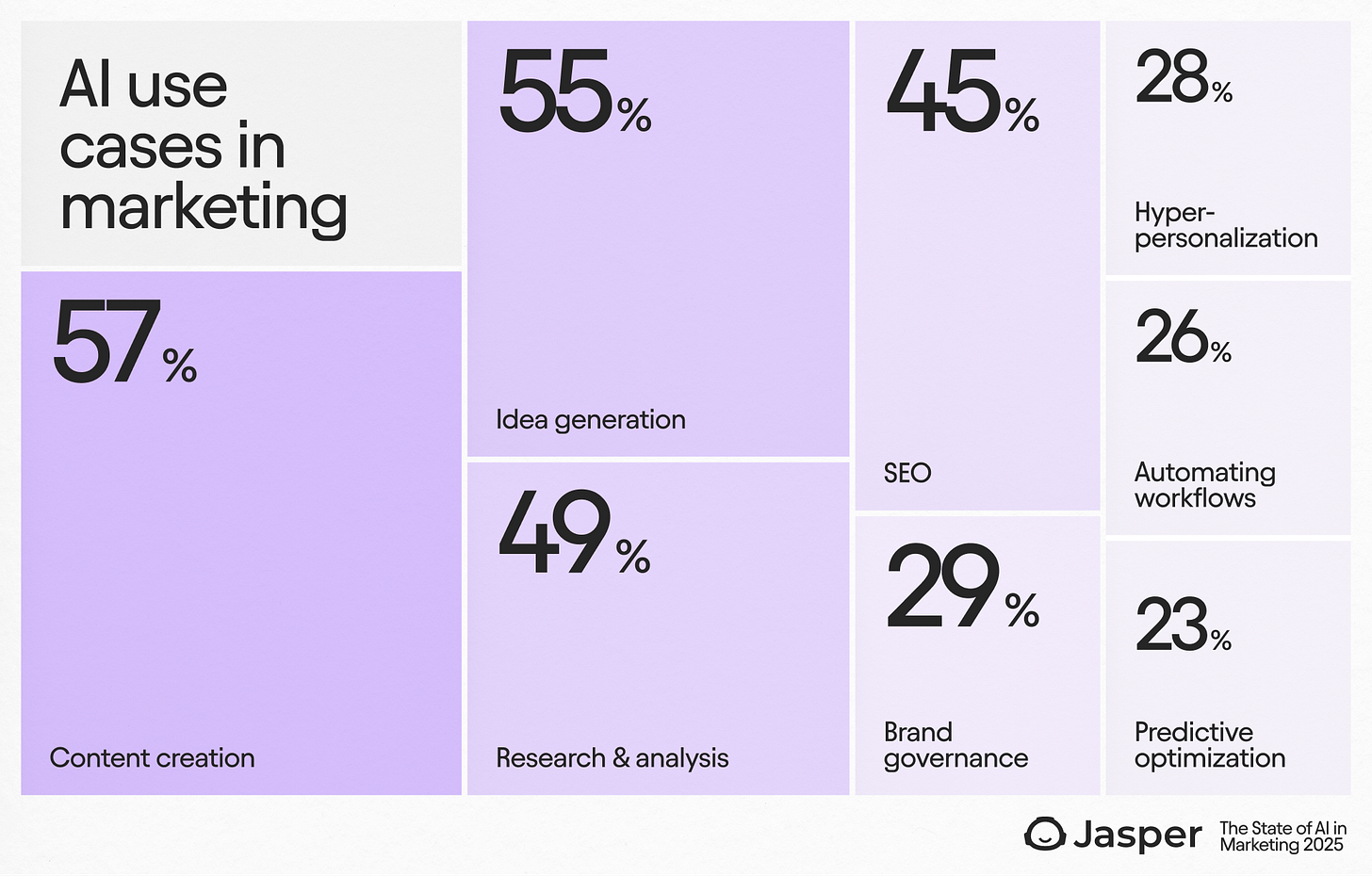
How Estée Lauder is Redefining Beauty Marketing with AI
This is today's edition of Agentic Marketing, our weekly newsletter that shares news and applications on marketing automation and trends in AI marketing.
In the Spotlight
In the fast-paced world of beauty and cosmetics, staying ahead of trends is everything. But with consumer preferences shifting faster than ever, how can brands keep up?
Enter Estée Lauder, a global beauty giant that’s leveraging Microsoft’s AI ecosystem to revolutionize trend forecasting, consumer insights, and marketing efficiency. This isn’t just a tech upgrade—it’s a game-changer for how brands connect with their audiences.
Let’s dive into how Estée Lauder is using AI to stay ahead of the curve—and what it means for the future of marketing.
The AI Tools Powering Estée Lauder’s Transformation
Estée Lauder’s secret sauce lies in its use of Microsoft 365 Copilot, Copilot Studio, Azure OpenAI Service, and Azure AI Search. These tools power its proprietary AI agents, ConsumerIQ and Trend Studio, which are designed to:
Analyze consumer behavior and preferences.
Detect emerging trends from vast datasets.
Generate marketing assets like product descriptions and campaign ideas.
The beauty of this system is its ability to turn data into actionable insights in seconds, not days.
By integrating these tools into its workflows, Estée Lauder has transformed how its teams operate, reducing manual tasks and enabling faster, data-driven decision-making.
How AI is Solving Real Marketing Challenges
Estée Lauder’s AI-driven approach addresses some of the biggest pain points in marketing today:
Slow Trend Response Times: AI accelerates trend detection, allowing the brand to respond to shifts in consumer behavior almost instantly.
Data Silos: By breaking down barriers between datasets, AI provides a holistic view of consumer insights across 25 brands and 150 countries.
Inefficient Processes: Repetitive tasks like data retrieval and reporting are automated, freeing up teams to focus on strategy and creativity.
With AI, we’re not just keeping up with trends—we’re predicting them before they happen.
Why This Matters: The Bigger Picture for AI in Marketing
Estée Lauder’s success story is a glimpse into the future of marketing—a future where AI-first strategies are the norm. Here’s why this case is a bellwether for the industry:
Speed and Agility: In a world where trends can go viral overnight, AI enables brands to act fast and stay relevant.
Personalization at Scale: AI tools like ConsumerIQ allow brands to deliver hyper-targeted campaigns that resonate with individual consumers.
Efficiency Gains: By automating repetitive tasks, AI frees up marketing teams to focus on high-value activities like strategy and innovation.
The beauty industry alone is projected to see a $9–10 billion impact from generative AI by 2025 (McKinsey). But the implications extend far beyond beauty—this is a blueprint for any brand looking to thrive in the age of AI.
Actionable Takeaways for Marketers
Ready to bring AI into your marketing strategy? Here’s how to get started:
Evaluate AI Tools: Explore how platforms like Microsoft Copilot can integrate into your workflows. Start with a pilot project in trend forecasting or content creation.
Invest in Data Infrastructure: Ensure your organization has a robust data ecosystem to support AI-driven insights. Break down silos and centralize your data.
Train Your Teams: Upskill your employees in AI tools and data literacy. The more your team understands AI, the more effectively they can use it.
As Estée Lauder’s case shows, the future of marketing is AI-first. From real-time trend detection to personalized campaigns, the possibilities are endless. The question isn’t whether your brand should adopt AI—it’s how soon you can start.
AI isn’t just a tool—it’s a mindset. The brands that embrace it will be the ones shaping the future.
So, what’s your next move?
Trends to Watch
February 2025 saw 42 CMO hires, with 19 being first-time C-suite executives, highlighting a surge in demand for marketing leadership in technology and financial services sectors. [Ad Age]
AI Transforming Marketing: Trends, Challenges, Opportunities
A 2025 report by Jasper, based on insights from 500+ marketers, reveals widespread generative AI adoption (63%) but highlights gaps in ROI tracking (51%) and high-value use cases.

8 Key trends include shifting to domain-specific AI, addressing data privacy, and scaling AI for measurable impact. [Jasper]
AI Redefines Experiential Marketing with Adaptive Systems
Jason Snyder of Momentum Worldwide predicts AI will transform experiential marketing into dynamic, self-optimizing ecosystems. AI enables real-time, personalized experiences, blending physical and digital realms, and shifts audiences from passive consumers to active co-creators.
This evolution demands ethical considerations to balance personalization and human agency. [The Drum]
I Shopping Agents Redefine Retail Future
Salesforce and Accenture predict autonomous AI agents will revolutionize retail by completing shopping tasks independently, shifting focus from generative AI to actionable AI.
Brands must adapt digital strategies, content, and media to align with AI-driven consumer behavior. [Forbes]
Quotes
43%
Only 43% of (AI) adopters have a formalized AI program in place.
Jasper points out that without a clear plan, businesses may fail to fully use AI for strategy, operations, and tracking results. [Jasper]
You have the nerve to fill my inbox with spam I didn't ask for, and now you can't even be bothered to let humans craft these messages?
A guy complained about annoying Uber emails and noticed a note saying they might be AI-made. [Android Police]
Fresh Finds
Here are this week's updates on marketing tools or services.
1. Salesforce Launches Autonomous AI Platform
Salesforce introduces Agentforce 2dx, enabling AI agents to operate proactively across enterprise systems without constant human oversight. [VentureBeat]
2. Scrunch AI Optimizes Company Presence in AI Search
Scrunch AI helps enterprises adapt to AI-driven search by auditing and optimizing their online visibility for AI bots. [TechCrunch]
3. Google Launches AI Fashion Search Tool
Google introduces "Vision Match," an AI feature for its Shopping tab, enabling users to describe and find clothing ideas. [TechCrunch]
4. Microsoft Introduces AI-Powered Ads in Copilot
Microsoft unveils new AI ad formats in Copilot, blending search and shopping with interactive features and branded AI agents. [Adweek]
5. Agentic AI Enhances Ad Compliance
Jivox launches an AI tool for ad compliance, reducing delays and ensuring brand guidelines. [MediaPost]
6. Google Explores Ads in AI Mode
Google plans to introduce ads into its new AI Mode, drawing inspiration from AI Overviews, with potential challenges for advertisers. [Adweek]
7. Meta Tests AI Agents for Business-Customer Interaction
Meta is piloting AI agents that allow users to interact with businesses via text or voice, providing product information and promotional offers. [Marketing Brew]




